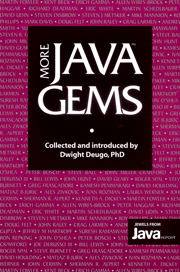Book contents
- Frontmatter
- Contents
- INTRODUCTION
- GETTING STARTED WITH JAVA
- MIGRATING TO JAVA
- TECHNIQUES 101
- MODELING AND PATTERNS
- JAVA IN A DISTRIBUTED WORLD
- THREADS
- USER INTERFACES
- SECURITY
- TESTING
- PERFORMANCE
- COMPLEX JAVA APPLICATIONS: BREAKING THE SPEED LIMIT
- ARE DISTRIBUTED OBJECTS FAST ENOUGH?
- EFFICIENT TEXT SEARCHING IN JAVA
- ENTERPRISE APPLETS AND ARCHIVE FUNCTIONALITY
- REALITY CHECK
- INDEX
ARE DISTRIBUTED OBJECTS FAST ENOUGH?
Published online by Cambridge University Press: 06 July 2010
- Frontmatter
- Contents
- INTRODUCTION
- GETTING STARTED WITH JAVA
- MIGRATING TO JAVA
- TECHNIQUES 101
- MODELING AND PATTERNS
- JAVA IN A DISTRIBUTED WORLD
- THREADS
- USER INTERFACES
- SECURITY
- TESTING
- PERFORMANCE
- COMPLEX JAVA APPLICATIONS: BREAKING THE SPEED LIMIT
- ARE DISTRIBUTED OBJECTS FAST ENOUGH?
- EFFICIENT TEXT SEARCHING IN JAVA
- ENTERPRISE APPLETS AND ARCHIVE FUNCTIONALITY
- REALITY CHECK
- INDEX
Summary
Java is becoming important for building real-world, mission-critical applications. Although Java is still not a perfect language, it is becoming more mature every day. We all know the advantages of Java, especially the “write once, run anywhere” approach, but we are also aware of the disadvantages (its performance being the most commonly offered reason for not using Java).
In spite of that, there are many large companies claiming they are developing their crucial business applications in Java. Modern applications are not monolithic programs, they are built of objects. Therefore, developers need a “glue” for bringing all the pieces together and coordinating them into a functional application. Object location independence is an advantage that gives developers the ability to structure the application into multiple tiers.
For building distributed applications in Java it is natural to choose the Remote Method Invocation (RMI), but there is another possibility—the Common Object Request Broker Architecture (CORBA). CORBA is a valuable alternative to RMI. We could describe CORBA as a superset of RMI, although both technologies are not compatible yet. Both CORBA and RMI allow remote method invocation independently of location, however, CORBA is more than just an object request broker. It offers programming language independence and a rich set of object services and common facilities all the way to the business objects.
There are multiple factors that can affect the decision. One of them is certainly the performance.
- Type
- Chapter
- Information
- More Java Gems , pp. 391 - 404Publisher: Cambridge University PressPrint publication year: 2000
- 2
- Cited by



